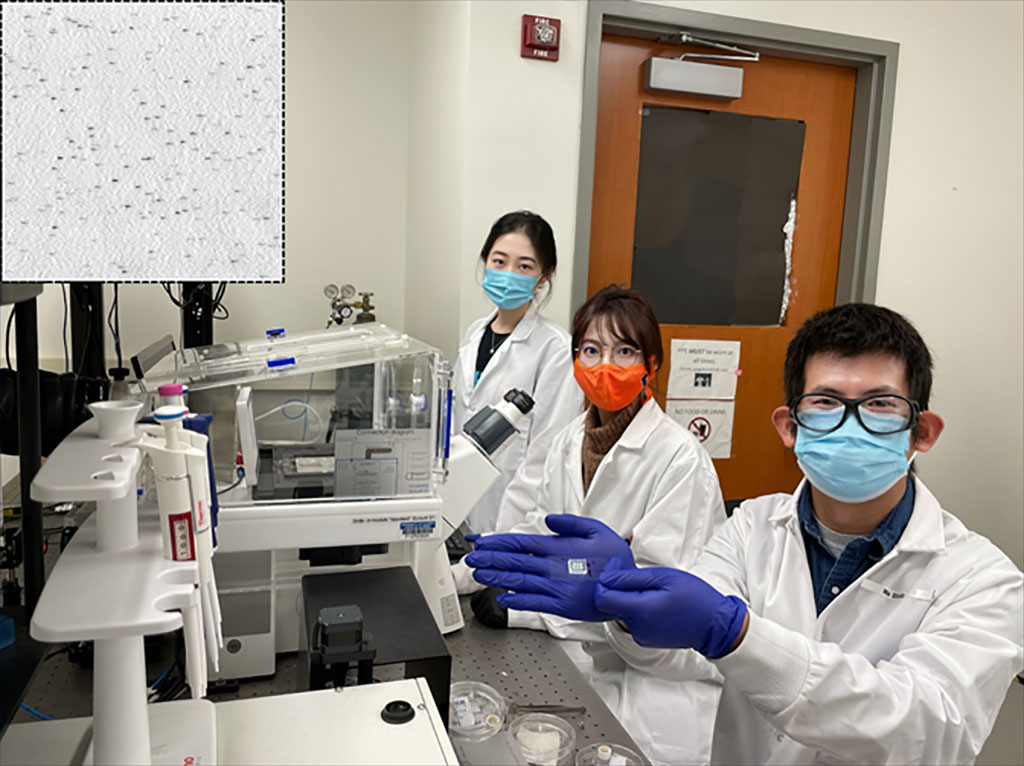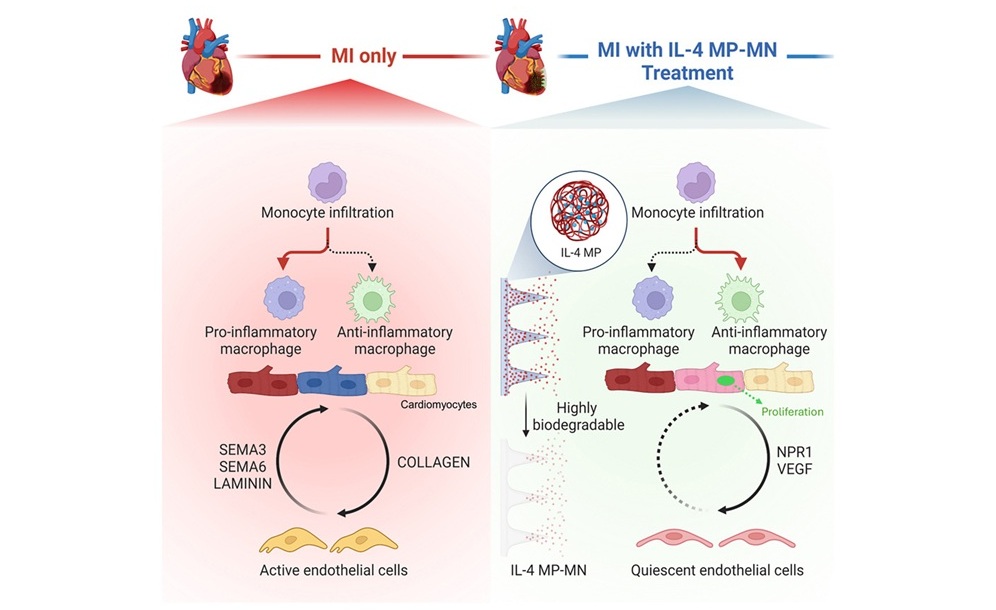New Simple, 15-Minute Sample-to-Answer COVID-19 Test Used with Desktop Detection System Costs Less than USD 2
|
By HospiMedica International staff writers Posted on 03 Feb 2021 |

Image: The HMNTL team displays new COVID-19 antibody test. At the top left corner is a PRAM image in which each black dot represents one detected COVID-19 antibody molecule (Photo courtesy of University of Illinois)
A simple, 15-minute sample-to-answer antibody test that costs less than USD 2 and is used with a desktop detection system could make COVID-19 testing more fast, cheap, and accessible.
The cost efficient COVID-19 antibody test developed by researchers from the Holonyak Micro & Nanotechnology Lab at The Grainger College of Engineering University of Illinois (Urbana, IL, USA) is based on a “flu chip” that was being developed before the pandemic to rapidly determine the most likely cause of a fever by measuring several proteins within a droplet of blood.
Serological (detected by blood sample) antibody testing is an important diagnostic tool for combating the COVID-19 pandemic. Studies have shown that measurement of SARS-CoV-2 specific antibodies may be helpful for the diagnosis of suspected patients with negative RT-PCR results and for the identification of asymptomatic infections – a cause for concern as vaccinations may lessen or eliminate symptoms as well as prevent infection. Quantitative measurement of COVID-19 antibody titer is also vital for blood transfusion therapy, which has shown promising results for treating patients with severe symptoms.
The new highly sensitive, fast, and low-cost test demonstrates great potential for wide applications in diverse working environments. COVID antibody testing could become routine and simple as a variety of vaccines are deployed whose long-term protection is not yet fully known. The test is simple enough to be performed at schools, health clinics, pharmacies, and parts of the world where diagnostic laboratories are not available.
“Compared with other detection methods, our method is a simple, 15-minute sample-to-answer test,” said Bin Zhao, a postdoctoral research associate and IGB Fellow. “It costs less than USD 2 per test and is used with a desktop detection system that is suitable for point-of-care situations like clinics and physician offices.”
“Our developed method is not only rapid and simple, but also highly sensitive and quantitative. It also requires only a fingerstick quantity of blood (~ 4 µL),” added Nantao Li, an ECE and Holonyak Lab graduate student. “The method that we used to detect COVID-19 antibody can also be adapted to detect other molecules, such as antibodies to other viral pathogens, biomarkers for cardiac disease, and biomarkers for cancer.”
Related Links:
University of Illinois
The cost efficient COVID-19 antibody test developed by researchers from the Holonyak Micro & Nanotechnology Lab at The Grainger College of Engineering University of Illinois (Urbana, IL, USA) is based on a “flu chip” that was being developed before the pandemic to rapidly determine the most likely cause of a fever by measuring several proteins within a droplet of blood.
Serological (detected by blood sample) antibody testing is an important diagnostic tool for combating the COVID-19 pandemic. Studies have shown that measurement of SARS-CoV-2 specific antibodies may be helpful for the diagnosis of suspected patients with negative RT-PCR results and for the identification of asymptomatic infections – a cause for concern as vaccinations may lessen or eliminate symptoms as well as prevent infection. Quantitative measurement of COVID-19 antibody titer is also vital for blood transfusion therapy, which has shown promising results for treating patients with severe symptoms.
The new highly sensitive, fast, and low-cost test demonstrates great potential for wide applications in diverse working environments. COVID antibody testing could become routine and simple as a variety of vaccines are deployed whose long-term protection is not yet fully known. The test is simple enough to be performed at schools, health clinics, pharmacies, and parts of the world where diagnostic laboratories are not available.
“Compared with other detection methods, our method is a simple, 15-minute sample-to-answer test,” said Bin Zhao, a postdoctoral research associate and IGB Fellow. “It costs less than USD 2 per test and is used with a desktop detection system that is suitable for point-of-care situations like clinics and physician offices.”
“Our developed method is not only rapid and simple, but also highly sensitive and quantitative. It also requires only a fingerstick quantity of blood (~ 4 µL),” added Nantao Li, an ECE and Holonyak Lab graduate student. “The method that we used to detect COVID-19 antibody can also be adapted to detect other molecules, such as antibodies to other viral pathogens, biomarkers for cardiac disease, and biomarkers for cancer.”
Related Links:
University of Illinois
Latest COVID-19 News
- Low-Cost System Detects SARS-CoV-2 Virus in Hospital Air Using High-Tech Bubbles
- World's First Inhalable COVID-19 Vaccine Approved in China
- COVID-19 Vaccine Patch Fights SARS-CoV-2 Variants Better than Needles
- Blood Viscosity Testing Can Predict Risk of Death in Hospitalized COVID-19 Patients
- ‘Covid Computer’ Uses AI to Detect COVID-19 from Chest CT Scans
- MRI Lung-Imaging Technique Shows Cause of Long-COVID Symptoms
- Chest CT Scans of COVID-19 Patients Could Help Distinguish Between SARS-CoV-2 Variants
- Specialized MRI Detects Lung Abnormalities in Non-Hospitalized Long COVID Patients
- AI Algorithm Identifies Hospitalized Patients at Highest Risk of Dying From COVID-19
- Sweat Sensor Detects Key Biomarkers That Provide Early Warning of COVID-19 and Flu
- Study Assesses Impact of COVID-19 on Ventilation/Perfusion Scintigraphy
- CT Imaging Study Finds Vaccination Reduces Risk of COVID-19 Associated Pulmonary Embolism
- Third Day in Hospital a ‘Tipping Point’ in Severity of COVID-19 Pneumonia
- Longer Interval Between COVID-19 Vaccines Generates Up to Nine Times as Many Antibodies
- AI Model for Monitoring COVID-19 Predicts Mortality Within First 30 Days of Admission
- AI Predicts COVID Prognosis at Near-Expert Level Based Off CT Scans
Channels
Critical Care
view channel
Biodegradable Patch Repairs Damaged Tissue After Heart Attack
A heart attack causes sudden loss of oxygen to the heart muscle, triggering cell death and a strong inflammatory response that often leads to scar formation. While scarring helps stabilize the heart, it... Read more
Magnetically Guided Microrobots to Enable Targeted Drug Delivery
Stroke affects 12 million people globally each year, often causing death or lasting disability. Current treatment relies on systemic administration of clot-dissolving drugs, which circulate throughout... Read more
Smart Nanomaterials Detect and Treat Traumatic Brain Injuries Simultaneously
Traumatic brain injury (TBI) continues to leave millions with long-term disabilities every year. After a sudden impact from a fall, collision, or accident, the brain undergoes inflammation, oxidative stress,... Read more
Earlier Blood Transfusion Could Reduce Heart Failure and Arrhythmia in Heart Disease Patients
Blood loss during or after surgery can place significant stress on people with heart disease, increasing the risk of dangerous complications. Transfusions are often delayed until hemoglobin levels fall... Read moreSurgical Techniques
view channelNovel Endoscopy Technique Provides Access to Deep Lung Tumors
Detecting lung cancer early can save lives, but diagnosing small tumors deep in the outer regions of the lungs remains a major clinical challenge. Although CT scans frequently identify tiny suspicious... Read more
New Study Findings Could Halve Number of Stent Procedures
When a coronary artery becomes acutely blocked during a heart attack, opening it immediately is essential to prevent irreversible damage. However, many patients also have other narrowed vessels that appear... Read morePatient Care
view channel
Revolutionary Automatic IV-Line Flushing Device to Enhance Infusion Care
More than 80% of in-hospital patients receive intravenous (IV) therapy. Every dose of IV medicine delivered in a small volume (<250 mL) infusion bag should be followed by subsequent flushing to ensure... Read more
VR Training Tool Combats Contamination of Portable Medical Equipment
Healthcare-associated infections (HAIs) impact one in every 31 patients, cause nearly 100,000 deaths each year, and cost USD 28.4 billion in direct medical expenses. Notably, up to 75% of these infections... Read more
Portable Biosensor Platform to Reduce Hospital-Acquired Infections
Approximately 4 million patients in the European Union acquire healthcare-associated infections (HAIs) or nosocomial infections each year, with around 37,000 deaths directly resulting from these infections,... Read moreFirst-Of-Its-Kind Portable Germicidal Light Technology Disinfects High-Touch Clinical Surfaces in Seconds
Reducing healthcare-acquired infections (HAIs) remains a pressing issue within global healthcare systems. In the United States alone, 1.7 million patients contract HAIs annually, leading to approximately... Read moreHealth IT
view channel
EMR-Based Tool Predicts Graft Failure After Kidney Transplant
Kidney transplantation offers patients with end-stage kidney disease longer survival and better quality of life than dialysis, yet graft failure remains a major challenge. Although a successful transplant... Read more
Printable Molecule-Selective Nanoparticles Enable Mass Production of Wearable Biosensors
The future of medicine is likely to focus on the personalization of healthcare—understanding exactly what an individual requires and delivering the appropriate combination of nutrients, metabolites, and... Read moreBusiness
view channel
Philips and Masimo Partner to Advance Patient Monitoring Measurement Technologies
Royal Philips (Amsterdam, Netherlands) and Masimo (Irvine, California, USA) have renewed their multi-year strategic collaboration, combining Philips’ expertise in patient monitoring with Masimo’s noninvasive... Read more
B. Braun Acquires Digital Microsurgery Company True Digital Surgery
The high-end microsurgery market in neurosurgery, spine, and ENT is undergoing a significant transformation. Traditional analog microscopes are giving way to digital exoscopes, which provide improved visualization,... Read more
CMEF 2025 to Promote Holistic and High-Quality Development of Medical and Health Industry
The 92nd China International Medical Equipment Fair (CMEF 2025) Autumn Exhibition is scheduled to be held from September 26 to 29 at the China Import and Export Fair Complex (Canton Fair Complex) in Guangzhou.... Read more








.jpg)







